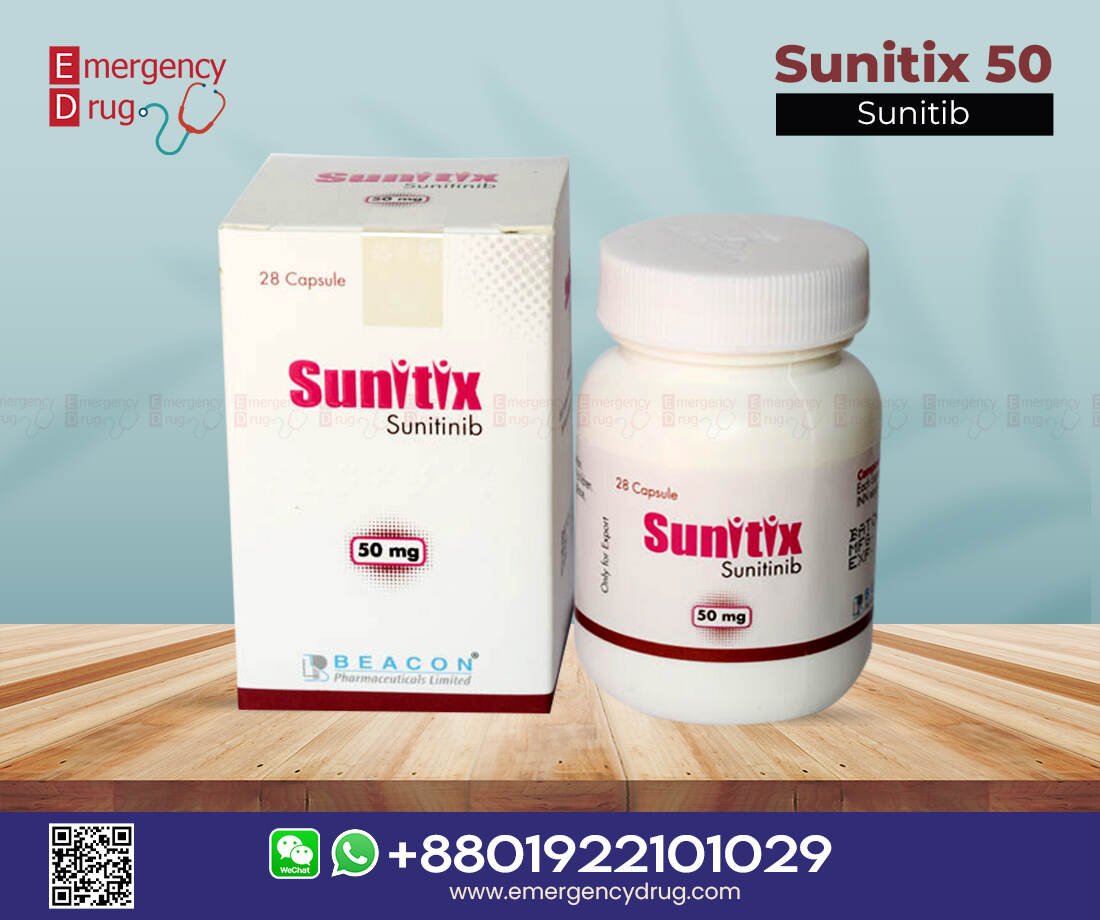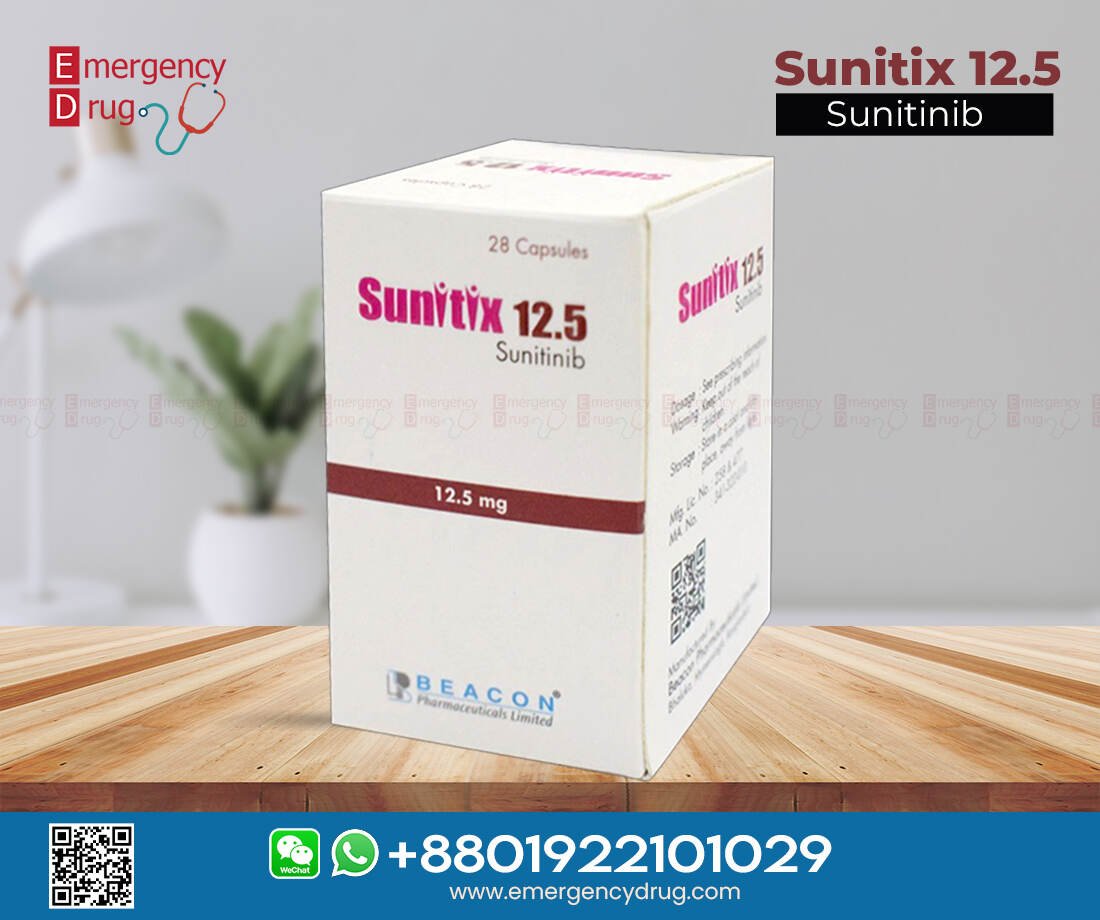Description
Sunitix (Sunitinib) Tablets is an anti-cancer medication. It blocks the action of the abnormal protein that signals cancer cells to multiply. This prevent to stop or slow the spread of cancer cells.
Product Features:
| Product Name | : Sunitix |
| Generic Name | : Sunitinib |
| Manufacturer | : Beacon Pharma Ltd |
| Indication | : Kidney cancer |
| Formulation | : Capsule |
| Strength | : 25 mg |
| Quantity | : 28 Capsules |
| Storage | : Below 30° |
| Registrations | : Export Only |
Indications
Gastrointestinal Stromal Tumor (GIST): It indicate for the treatment of gastrointestinal stromal tumor after disease progression on or intolerance to imatinib mesylate.
Advanced Renal Cell Carcinoma (RCC): This indicate for the treatment of advanced renal cell carcinoma.
Advanced Pancreatic Neuroendocrine Tumors (pNET): Sunitix indicate for the treatment of progressive, well-differentiated pancreatic neuroendocrine tumors in patients with unresectable locally advanced or metastatic disease.
Pharmacology
Sunitix (Sunitinib) inhibits cellular signaling by targeting multiple receptor tyrosine kinases (RTKs).
These include all receptors for platelet-derived growth factor (PDGF-Rs) and vascular endothelial growth factor receptors (VEGFRs). which play a role in both tumor angiogenesis and tumor cell proliferation. The simultaneous inhibition of these targets. Therefore reduces tumor vascularization and triggers cancer cell apoptosis and thus results in tumor shrinkage.
Sunitinib also inhibits CD117 (c-KIT), the receptor tyrosine kinase that (when improperly activated by mutation) drives the majority of gastrointestinal stromal cell tumors. It has been recommended as a second-line therapy for patients whose tumors develop mutations in c-KIT that make them resistant to imatinib, or who the cannot tolerate the drug.
In addition, Sunitinib binds other receptors. These include: RET, CD114, CD135. The fact that Sunitix targets many different receptors. Leads to many of its side effects such as the classic hand-foot syndrome, stomatitis, and other dermatologic toxicities.
Dosage & Administration
Recommended Dose For GIST And RCC: The recommended dose of medicine for gastrointestinal stromal tumor (GIST) and advanced renal cell carcinoma (RCC) is one 50 mg oral dose need to take once daily. On a schedule of 4 weeks on treatment follow by 2 weeks off (Schedule 4/2). Sunitix (Sunitinib) take to with or without food.
Recommended Dose For pNET: The recommended dose of Capsule for pancreatic neuroendocrine tumors (pNET) is 37.5 mg taken orally once daily continuously without a scheduled off-treatment period.
Dose Modification
Dose interruption and/or dose modification in 12.5 mg increments or decrements recommend based on individual safety and tolerability. The maximum dose administered in the Phase 3 pNET study was 50 mg daily.
Alternate concomitant medication with no or minimal enzyme inhibition potential is recommended. A dose reduction to a minimum of 37.5 mg (GIST and RCC) or 25 mg (pNET). Daily consider as Sunitix must co-administer with a strong CYP3A4 inhibitor
Selection of an alternate concomitant medication with no or minimal enzyme induction potential recommend. A dose increase for Sunitix to a maximum of 87.5 mg (GIST and RCC) or 62.5 mg (pNET) daily consider if Sunitix must co-administer with a CYP3A4 inducer. If dose increase, the patient monitor carefully for toxicity.
Interaction
Increased plasma cone with strong CYP3A4 inhibitors (eg ketoconazole, ritonavir, itraconazole, erythromycin, clarithromycin, grapefruit juice). Decreased plasma cone with strong CYP3A4 inducers [eg rifampin, dexamethasone, phenytoin, carbamazepine, phenobarb, St. John’s wort (Hypericum perforatum)]. Anticoagulants eg warfarin, acenocoumarol (periodically monitor platelets, prothrombin time/INR & physical exam).
Side Effects
Common side effects of Sunitix (Sunitinib) include:
- tiredness
- weakness
- diarrhea
- pain, swelling or sores inside of your mouth
- nausea
- loss of appetite
- indigestion
- vomiting
- stomach-area (abdominal) pain
- blisters or rash on the palms of your hands and soles of your feet
- high blood pressure
- taste changes
- low platelet counts






Reviews
There are no reviews yet.